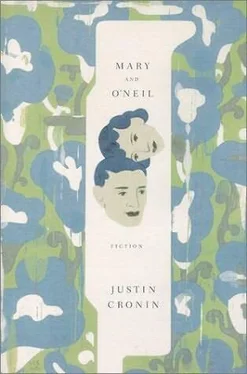The doctor has suggested that Mary walk, and O’Neil helps her out of bed and into her robe. He is uncertain how much weight he should bear, and he settles for letting her take his arm, like a couple walking down the aisle. For four hours more they shuffle the short hallway of the hospital’s labor and delivery unit, from the empty operating room where cesareans are performed to the front doors and back again, pausing whenever Mary has a contraction so she can brace herself against the wall. Most of the other rooms are empty, though as they pass one door they hear a woman’s deep, throaty moans, and a man’s voice telling her to push. When they pass it the next time they hear a baby crying.
When Mary can walk no more, Dr. Sullivan examines her again. Mary’s contractions are so tightly spaced that it is hard to tell where one ends and the next begins. The day has turned to late afternoon, and someone has drawn the drapes in Mary’s room to shield her face from the low, sharp light streaming in. O’Neil misses his wife, who seems to have gone far, far away from him.
“Have you eaten anything?” Dr. Sullivan asks him.
O’Neil can’t remember. He guesses he hasn’t. He is holding Mary’s damp hand and wiping her face with a cloth he has moistened in the pitcher on the table by her bed.
“Well, you better get something if you’re going to.” Dr. Sullivan snaps off her gloves and speaks in a bright, loud voice. “Ten centimeters, Mary. I think we’re off to the races here.”
A fresh energy fills O’Neil, and he decides he can make it; there’s a candy machine in the hallway, and he asks Rachel-back for the night shift, still with her happy smile and jokey button-if she’d mind getting him something, anything, to tide him over. O’Neil telephones Mary’s parents in Minnesota from the phone on the bedside table to tell them the baby is coming. Rachel hands him a tiny cellophane tray of yellow cheese and stale Saltines while the phone is ringing in his in-laws’ house, a thousand miles away, and a burst of saliva washes down the insides of his mouth; he hadn’t realized he was so hungry. When the answering machine picks up, O’Neil decides not to leave a message, because his mouth is full of the cheese and crackers. He would rather call later to tell them that their granddaughter has been born, anyway.
In bed Mary raises her thighs with her hands and bends her chin to her chest. “Can I push now? Oh please… I… want… to… push.”
O’Neil takes her hand. “Can she?”
“I’d say you already are,” Dr. Sullivan says.
Mary in labor, dreaming of crows: she is on her knees, vomiting into the snow and corn stubble, and when she looks up she sees them-their glistening beaks and dark eyes on her, on the terrible thing she’s done. Her car idles on the side of the road behind her. At the clinic they told her she should not drive. A baby, she thinks; I am twenty-two and it was a baby.
The vision scatters; her next contraction comes, obliterating her, every memory she has ever contained. It bears down on her in a black cone, a roar enveloping her like a subway bursting from its tube into the station, only the train does not stop. It roars and roars, full speed past the platform, the air around her shuddering with the heat and weight and noise of it. A chorus of voices tells her to push, and Mary knows she is. Like a flock of birds, every atom of her body turns and points itself toward pushing, but the place where force must be applied is deep within her, a point of light that moves whenever she looks at it. If she can find it, she knows, the light will become a face, her daughter’s face, and the baby will be born.
How much time has passed, she does not know. Behind the drapes the sun has set, but Mary cannot remember if it is the first evening of her labor, or the second, or even, impossibly, the third. She has been doing this forever, trying to push the baby out. Another contraction comes, and she counts the cars as they blow past-twenty, thirty, forty. O’Neil is telling her to push, and she wishes she could do something for him, tell him not to be afraid. Between the contractions it is like dreaming, what she feels; her body seems scattered and broken, pieces of a puzzle spread across the floor, each one a different picture of something that has happened to her: waiting in the rain for someone to pick her up after a dance at school; O’Neil diving into a lake, his arms and legs flailing as he laughs and then is swallowed by the water; the crows and the corn stubble and their glistening gaze upon her. It is only a moment, this oasis of the past. She opens her eyes then and sees O’Neil, his glasses fogging, and beyond him the silver edge of the portable steel lights that have been brought into the room so the doctors and nurses can see the baby coming; she hears her own voice, howling, almost hooting, and knows that it is O’Neil’s hand she feels in her own, and that soon she will return to him. She closes her eyes again, letting the contraction take her: Louise, she thinks, Louise. She named her, the first one she did not, could not have, ten years ago, when she was twenty-two; in her heart she had given her the name Louise, there in the wintry field where she knelt with the crows’ eyes on her, telling Mary what she had done and what it meant, and that nothing-not even the pain she feels now-would take this burden from her. Louise, she thinks again. Then: Nora. Nora. A voice, O’Neil’s voice, tells her the baby’s head is crowning, and that her hair is blond, like Mary’s. The roar swallows her again, for what Mary knows is the last time. It is a train, a comet, the moon set loose and sailing down to her, taking her over, and at once it becomes the light that she has worked to find. Her body wraps around it, this light that is first two faces and then just one, a great calm fills her, and Mary pushes the baby out, safe and well: alive.
It is after eleven by the time Mary and the baby are settled down in their new room, where a cot has been wheeled in for O’Neil to spend the night with them. Their little girl is small, just six and a half pounds, and wearing a diaper and T-shirt that looks to O’Neil as tiny as doll clothes. Propped up in bed with Nora in her arms, Mary opens her robe and guides her to her breast; the baby latches on at once, her pink mouth pulling at Mary’s flesh in a languid rhythm that seems to O’Neil a pure force of nature. He strokes Mary’s hair, then gives one finger to Nora, who wraps her fingers around it and squeezes. She tugs at it to match the cadence of her mouth. O’Neil feels his knees buckle. “Wow,” he says.
When Rachel comes to change the baby’s diaper, O’Neil leaves the two of them in the room and takes the elevator down to the ground floor to find something to eat. But the truth is, he’s too tired to eat, or even sleep. What he wants is a moment alone with the idea of the day and what has happened: that he has watched his wife have a baby, and that her name is Nora. He wouldn’t mind standing a minute outside, someplace quiet and ordinary, even if it means standing by the Dumpsters. He passes the cafeteria, which is closed, and beyond it a room with vending machines, and a small lounge where someone in a white coat, a doctor or nurse, is lying on a sofa reading a People magazine in the dark. Then someone comes through a door O’Neil hadn’t noticed, and he realizes he has found what he is looking for.
The door opens onto a little portico, with a wheelchair ramp leading down to the lawn and a large ashtray full of butts. More cigarettes are scattered on the ground. O’Neil looks around, and sees that he is at the back of the hospital. It would be the right time, he thinks, to smoke, but he doesn’t; he wishes he did. There is a stretch of grass beyond the portico, and what looks like a garden with beds of flowers and a bench. The moon has risen, and everything is very still.
Читать дальше












